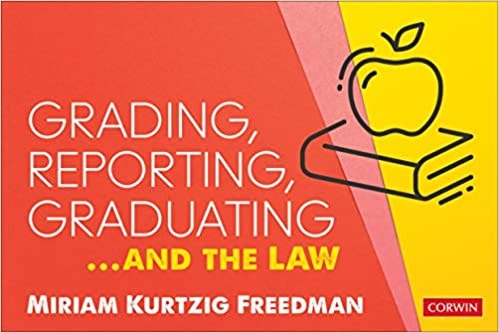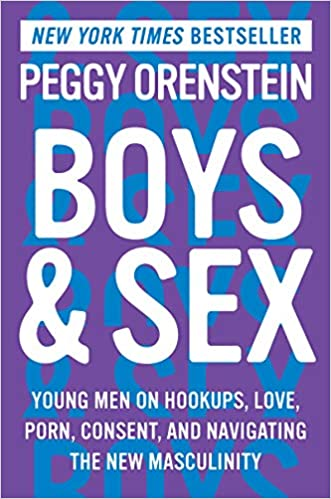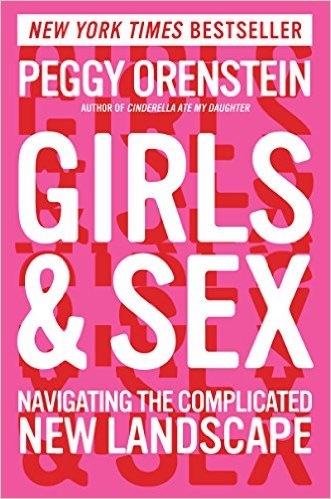Author Archive
Saturday, July 18th, 2020
Grading, Reporting, Graduating…and the Law by Miriam Kurtzig Freedman is a quick read that can help educators and parents learn about what the law requires so that parents can get their children what they deserve and so educators can obey the law and stay out of trouble as they provide their students with the services they are entitled to. Every school should have several copies.
Introduction: You’re kidding! Another law book for educators and parents! We’ve had enough!
- The goal here is to bridge the gap between the worlds of law and education and I feel that Miriam succeeds. The Every Student Succeeds Act (ESSA)requires that states develop a multiple-measure accountability system for all students. Schools need to communicate in plain language about how their children are doing. It needs to include WHAT the student studies and the level of difficulty. The law also prevents the school from reveling the students’ status. Each course has its own standards, while each child has their own needs. About 80% to 90% of students with disabilities have mild to moderate needs and can be taught in the regular classroom. That is the group that this book mostly deals with. The other 10% to 20% have profound needs, have alternate assessments, and alternate standards.
What are the legal requirements for grades and report cards, and setting policy for all students, general and special education?
- Although federal mandates have increased, education is a power that the constitution has left to local and state control. They must set clear standards, and if they do, the courts will back them up. This book contains many summaries of important court cases that help with understanding what schools must do and how to do it. Schools act as their state’s agents to provide public education and each student has the right to due process. Diplomas are property rights, but promotion and retention are not. Due process requires that high-stakes tests are also fair tests in that they measure what students had the opportunity to learn.
- States and local schools develop policies for these issues: class selection and eligibility, grades and report cards, promotion and retention, attendance requirements, gifted/talented programs, transcripts, honors, diplomas, graduation requirements, graduation ceremonies, waivers, and whatever else the school deems necessary. They proactively define course content, difficulty, performance standards, and how students are graded.
Getting more specific about grading policies and promotion/retenion
- Schools are in charge of determining grading Standards and policies. In order to earn regular grades, special education students need to meet the same standards even if their learning is adapted. Courts and hearing officers do not generally have the authority to change grades. Modified grades can be given if a student’s work is substantially different from general education standards even if they are in regular education classes. Such decisions are part of each student’s IEP. Weighted averages can be used if different courses in the same discipline have different degrees of difficulty. How difficult a course is for a particular student doesn’t matter. Schools must have clear course selection policies. Objective promotion and retention policies also need to be in place. Students should be retained for not doing the work, not because of a disability. Attendance policies apply equally to all students.
For students with disabilities: Section 504, ESSA, and the IDEA
- You can’t discriminate against any student simply because of their disability. Students are “otherwise qualified” if they can meet the essential requirements of a course or program. Fundamental alterations lower the standard or requirement. They don’t level the playing field, (accommodations) they change the game (modifications).
What are accommodations and modifications?
- You give students accommodations so they can meet regular course standards and requirements. You use modifications to lower the standards and requirements when necessary. These terms are often misused. Together they are things schools do for students with disabilities that they don’t do for general education students. Tests must accurately reflect what a student knows or is able to do in order to be valid. Accommodations provide access to students without lowering standards. They must not invalidate test scores. Schools may add accommodations to report cards, but not to transcripts. They should not result in adjusted grading and should not offer an unfair advantage.
- Modifications provide access also, but they do so by lowering standards and expectations. Modified curricula are not allowed. Rather, modifications are made on an individual basis as part of constructing IEPs. Both report cards and transcripts should record the use of modifications. Be careful about going overboard. This idea is to assist the children to learn, not to do the work for them.
Report cards, transcripts, honors, graduation, and diplomas: What’s okay?
- There are situations where schools do too much in the way of accommodations. An example would be giving a student a calculator rather than teaching him basic math computations. Accommodations and modifications should be designed to help the student reach his IEP goals, not pass a test or course. Students can be denied access to gifted programs as long as the criteria are objective. They cannot exclude students simply because they are classified or ELL. The same is true for school honors.
- A student’s special education status may be revealed on the report card as only parents see it. It can not be revealed on a transcript as it is seen by third parties. Focus on what the student studied and achieved, not WHO the student is. Any deviation from course standards must be spelled out in the IEP. Parents must be informed in Plain English. IEPs and 504 plans rise to the level of federal law and districts must implement them, so don’t promise what you can’t deliver.
Graduation requirements: Graduation, ceremony, diplomas
- Graduation requirements are set by the state and include courses, graduation tests, and attendance. Services end at graduation. All IEP goals need not be met for a school to graduate a student. Also, meeting all IEP goals does not guarantee a diploma. Parents must receive written notice prior to graduation. The contents of such notice are listed in this chapter. Transition planning must occur prior to graduation. Schools have the discretion to develop their own commencement ceremony criteria. They can also award a variety of diplomas to accommodate students who can’t earn a regular diploma.
Miriam Kurtzig Freedman
- Miriam is an attorney and former teacher who works with people who want better schools. As an immigrant to America at elementary-school-age, she was empowered by public schools and works to help educators teach all children. She works for the Boston firm of Stoneman, Chandler, & Miller where she gives lively and practical presentations, training, and consultations. She co-founded Special Education Day, authored eight books, and has written for many national publications. If you are interested in her presentations visit schoollawpro.com and contact her at miriam@schoollawpro.com.
Posted in Book Summaries, Education Books, Leadership Books | Comments Off on Grading, Reporting, Graduating…and the Law by Miriam Kurtzig Freedman
Saturday, July 11th, 2020
Boys and Sex: Young Men on Hookups, Love, Porn, Consent, and Navigating the New Masculinity by Peggy Orenstein finishes what she started with Girls and Sex, which is also summarized here. Once again she has conducted many interviews with young men and experts in many fields to paint a picture of how the same social forces that impact girls impact boys. Like her book on girls, all parents, boys, and girls should read my summaries and then get the books.
Introduction: What About the Boys?
- For this book Peggy increased the sample size of the boys she interviewed to over 100 (She interviewed 72 for the Girls book.) Again they were in college or heading for college and represented a geographical, racial, and sexual orientation mix. Unlike the “Girls” book she included trans genders here. Although she is old enough to be their mother, she felt that they were generally more forthcoming than the girls. It was also much easier to get parent permission. While parents talk precious little to their daughters about sex, they talk even less about it with their sons.
1. Welcome to Dick School
- Nearlly all of the boys in the study had egalitarian views about girls, thought they were smart and had platonic female friends. This is fairly new. Their definitions of masculinity, however, are right out of the 1950s. They included emotional detachment, rugged good looks, sexual prowess, athleticism, and the potential for wealth. Showing emotions is what girls do, which is not a good thing for boys. The young men who most internalize these masculine norms are more likely to have: sexually harassed a girl, bullied other boys, been victims of verbal or physical violence, engaged in binge-drinking, caused a car accident, been painfully lonely, been less happy, fewer close friends, been depressed, and been suicidal. They clearly pay a big price for being manly as do those around them.
- Generally, boys only discuss emotions and feelings with girlfriends, sisters, and their moms. With women doing the emotional labor, boys end up stunted in a state of arrested development. Toxic masculinity deals with emotional suppression, disparagement of the feminine, and bragging about sexual conquest. This is prominent in the “jock culture” and featured in “locker room talk.” As a result, athletes are three times more likely to be accused of sexual misconduct. In order to see things like rape as ok or even hilarious, boys learn to disregard others’ feelings as well as their own.
2. If It Exists, There Is Porn of It
- The big takeaway here is that today’s children are guinea pigs in a massive porn experiment and assessing porn’s impact isn’t easy as very little research funding is directed its way. All of the boys admitted to watching porn and some admitted to watching a lot. Parents and educators need to understand that porn is where their kids get most if not all of their sex ed. Intentional searches usually start when boys are 12 to 14. This is when most start to masturbate as they watch.
- Watching porn is likely to cause young people to become sexually active sooner, to have more partners, to have higher rates of pregnancy, to be more sexually aggressive, to view women more negatively, and to engage in more risky and atypical sexual behaviors depicted in porn. It can cause less pleasure from partnered sex, concerns about penis size, and anxiety (erectile disfunction) when engaging in foreplay.
- Perhaps main-stream media is more to blame as the scripts boys consume from childhood continuously objectify, demean, and are hostile or indifferent towards women. Unlike porn, which the boys know is about as real as professional wrestling, movies and TV shows are much more believable. Women in the business are often harrassed. The same is true for hip-hop music, the most popular music genre in the US who’s most devoted fans are typically white, suburban boys who are unlikely to know any black people.
3. Are You Experienced? Life and Love in a Hookup Culture
- Hookups presume a lack of connection and commitment although it can be the first step toward a relationship. Physical intimacy is the precursor to emotional intimacy if it happens at all. This is just the opposite of what most people experienced in previous generations. What happens during a hookup is rather vague. It can be anything from making out on the dance floor to intercourse. Some boys never engage in it while others do so every week. It is most common among affluent, white heterosexuals, and predominant in Greek life.
- Hookups are embedded in a school’s drinking culture. “Pre-game” afternoon drinking even when there isn’t a game leads to an evening of more drinking so when it’s time to hookup, both parties are often “hammered.” Boys are often told to ask permission prior to engaging in sex and to make sure the girl isn’t too drunk to know what she is doing. Hookup culture aligns with the values of contemporary masculinity: conquest over a connection, sex as status-seeking, and partners as disposable. Even for boys, they can be an emotional minefield causing inadequacy, anxiety, insecurity, confusion, disappointment, and embarrassment. There is a lot of peer pressure put on boys to hookup and brag about it. If boys understand this, at least they can make educated choices.
Posted in Book Summaries, Education Books, Leadership Books | Comments Off on Boys and Sex: Young Men on Hookups, Love, Porn, Consent, and Navigating the New Masculinity by Peggy Orenstein
Thursday, July 2nd, 2020
How to Know When It’s Time to See a Chiropractor?
by Dr. Brent Wells, D.C. is a good place to start if you are having pain or issues with your back or other joints. I have gone to chiropractors for many years and they have “fixed” a number of nagging issues for me. They will want to see you on a regular basis, but if you can’t afford that they can at least offer relief in the short run.
Introduction
- It can be difficult to know when is the right time to see a chiropractor. While it might be easy to ignore or muster through pain and limited movements, this can drastically affect your lifestyle. If you’re not able to move or do the things you love it can prove to be very troublesome, both mentally and physically. Below are a few signs that you can use to tell when it might be time to make an appointment.
The Benefits of Using Chiropractic Care
- Using chiropractic care comes with a handful of health benefits. One of the most important is that it helps to decrease tension and improve flexibility. Regular treatments can also naturally treat degenerative joint and tissue problems, such as arthritis.
- Chiropractors also use massage therapy to help with relieving pain and inflammation. If you’re a little nervous about having adjustments done, you could instead opt for a healing massage. In addition to this, physical rehab is usually offered. This can help with improving your range of motion while using hands-on techniques to train your body.

Six Signs That You Need to See a Chiropractor
- 1. You Have a Limited Range of Motion
One of the most tell-tale signs that you need to see a chiropractor is that you have a limited range of motion. This indicates that your body has a joint problem that is limiting your mobility. Why this happens depends on various issues, but it’s mainly caused by arthritis or spine injuries. A chiropractor will help to realign your joints and muscles by doing different types of manipulations. They will feel around areas on your back, neck, and shoulders, to find places of tension. They might even ask you to do specific stretches so they can better see how your body moves. Once they identify problematic areas, they will expertly move your body in a way to help provide relief. This will also improve circulation in the area which can prevent future flexibility issues.
- 2. You’re Suffering From Chronic Pain
If you suffer from chronic pain, such as in your face, back, or neck, it might be time to stop by a chiropractic office. Chronic pain can be treated by a chiropractor with the use of spinal manipulations. Because your spine interacts with most areas of your body, these manipulations will help to treat inflammation and tension almost anywhere.
- 3. You Have Intense or Frequent Headaches
Headaches are caused by a variety of different things. This includes stress, tension, spending too much time on the computer, environmental stimuli, or an underlying medical condition, like extreme intracranial pressure or tumors. A chiropractor will adjust your neck in certain directions to help release tension. Known as cervical manipulation, this adjustment uses force to apply pressure to your neck’s joints. This helps to realign them while also reducing any pressure in surrounding muscles. Besides adjustments, your chiropractor will also recommend natural ways to prevent headaches, such as avoiding teeth clenching and drinking plenty of water. After a few treatments, you should find that your headaches will decrease in their pain and number.
- 4. There’s Shooting Pain Down Your Legs
Shooting pain down your legs shows that your body is having nerve problems, such as sciatica, or has a herniated disc.
To help relieve this pain, a chiropractor will do spinal manipulations. These will stop muscle spasms while also releasing endorphins to help naturally relieve pain. A handful might also use a special device, such as an activator, that stimulates your nerves. Rather than using their hands, a chiropractor will move this device up and down your spine to apply short impulses to surrounding joints, muscles, and nerves.
- 5. You Have Severe Sinus Congestion
Some might be surprised to learn that chiropractors can help with healing sinus congestion. In fact, chiropractors often successfully treat this issue without you needing to take medications for it. By using manipulations on your upper spine, they’ll be able to release pressure around your main sinus passageway resulting in fluid drainage. They might also apply pressure to certain portions of your face near the nasal cavities to stimulate the nerves.
- 6. You Tend to Sit Often
If you have a job that requires you to sit for hours each day, you might want to stop by a chiropractic office. A sedentary life can put a lot of pressure on your spine, especially if you use a poor sitting position. Chiropractic care can improve your spine’s health and encourage you to use correct posture. (Doug: You should also look into getting a desk that lets you stand or sit.)
- Knowing the right time to see a chiropractor can be tough. By keeping these tips in mind, you’ll know when your body requires this extra help. Check out the references below for more information.
- Dr. Brent Wells, D.C. is the creator of Better Health Chiropractic & Physical Rehab which has multiple locations throughout Alaska. He belongs to the American Academy of Spine Physicians (AASP) and the American Chiropractic Association. He founded Better Health Chiropractic & Physical Rehab and has been a chiropractor for over 20 years. His practice has treated thousands of patients from different health problems using services designed to help give long-lasting relief.
- Dr. Wells is also the author of over 700 online health articles that have been featured on sites such as Dr. Axe, Organic Facts, and Thrive Global. He continues his education to remain active and updated in all studies related to neurology, physical rehab, biomechanics, spine conditions, brain injury trauma, and more.
References
Posted in What can Dr. Doug do for you? | Comments Off on How to Know When It’s Time to See a Chiropractor? by Dr. Brent Wells, D.C.
Monday, June 22nd, 2020
Girls and S*x: Navigating the Complicated New Landscape by Peggy Orenstein tells the real story of what it’s like being a girl from middle school to college in today’s highly sexualized climate. Peggy scoured current research and had in-depth interviews with over seventy high school and college girls to compile this gripping and sometimes discouraging story. I first listened to the book on Audible prior to buying the physical cook for this summary. I just got Boys and S*x and will post my summary soon. I use the asterisk to avoid having Google Ads not post ads for these reviews.
Introduction
- For this book Peggy interviewed more than seventy young women between the ages of fifteen and twenty, which is when most become sexually active. The group was diverse in terms of religion, politics, race, family composition, wealth, and sexual identification. They were, however, self-selected but all were hungry to talk about things like masturbation, oral sex, orgasm, and the complicated terrain of the hookup culture. Fully half experienced something on the coercion to rape spectrum.
- Despite seismic changes in expectations and opportunity, they are still subject to the same old double standard. Sexually active girls are “sluts” while boys are “players.” Good girls are shamed as virgins and prudes. Here the opposite of a negative is still a negative. Peggy found that the conversations changed her. In preparation, she also reviewed the literature and talked to psychologists, sociologists, pediatricians, educators, journalists, and other experts.
1. Matilda Oh Is Not an Object – Except When She Wants to Be
- At least some boys are very abusive with language, social media use, and even physical touching. Authorities often make things worse with actions that blame the victim. Blaming girls’ clothing for the thoughts and actions of boys, for example, is counterproductive and only a step from “she was asking for it.” Girls often engage in self-objectification, which can lead to depression and lower self-esteem. They learn that as females they need to project sex appeal. In addition to striving to be smart, nice, and friendly, they need to do it all while looking ‘hot’. As a man, Bruce Jenner used his body to win gold. As a woman, Caitlin Jenner displayed her body for attention.
- Girls are also more likely to use social media to show off their bodies with or without sexy clothing and are quick to tell each other they look hot. They are twice as likely to be coerced to send sexts as early as middle school, and many consider it to be safe sex. Thanks to celebrities like Kim Kardashian, the butt has become the latest body part to reduce women to objects. Unfortunately, Kim and her fellow divas encourage young girls to package their sexuality.
- The behavior of many popular celebrities like Miley Cyrus has lead to many young women dressing and behaving like the people they see on screen. Seventy percent of prime-time TV now contains sexual content. Movies also affect how girls and boys behave when they get together for parties.
- The role of pornography has also had an impact. Almost all boys watch it, which changes their expectations when it comes to having real sex. A lot of porn scenes feature the denigration of women as well. Like it or not, porn has a very large role in sex education for this generation. For many, it’s how they learn what sex is. To them, things like oral and anal sex are the norm. Porn also adds to the objectification of girls promoted by other media. Competing with porn stars can cause some girls to believe that they need to put on a show to keep a partner’s interest.
Posted in Book Summaries, Education Books, Leadership Books | Comments Off on Girls and S*x: Navigating the Complicated New Landscape by Peggy Orenstein
Monday, June 15th, 2020
How Not to Die: Discover the Foods Scientifically Proven to Prevent and Reverse Disease by Michael Greger, M.D. with Gene Stone explains what you can do to avoid dying from the 15 most common causes. It can also serve as a reference for current research on health and wellness with a focus on nutrition. Consider listening to it on Audible as I did and good luck living up to the title.
Doug’s Introduction
- At 405 pages of reading plus 157 pages of notes and index, this is more of a reference book than an easy read. I listened to it first on Audible and then ordered it so I could look up things when I wanted to. As a result, this summary will be less detailed than my usual efforts, but it should still be valuable in its own right. How Not to Die can be summed up in three phrases: don’t Smoke (duh), exercise regularly, and eat plants. These are all things I do. Prior to listening to this book I had been gradually cutting animal products from my diet. Now I am a total vegan, at least at home. I’m also well ahead of my goal of running 1,000 miles this year, and I feel great. I hope this works for you and your family too.
Dr. Greger’s Introduction
- Most deaths in the US are preventable, and they are strongly related to what we eat. Diet is the number one cause of death and disability. However, only a quarter of medical schools offer a single course in nutrition. When California tried to require nutritional training for doctors the California Medical Association was successful in stopping it. This is because the medical system is set up to financially reward prescribing pills and procedures. They don’t profit from lifestyle medicine. The one thing medical schools do require is pain management and end-of-life care.
- Our genes only account for about 10 to 20 percent of death risk. The rest is essentially our diet. Rates of heart disease and major cancers differ up to 100 fold among various populations around the world who have different diets. There is wide agreement in the research that healthy diets are plant-based and non processed. By this measure, the Standard American Diet with the ironic acronym SAD, scores pretty low. Although life expectancy has increased there are fewer functional years at the end. Some indicators suggest that life expectancies will decrease. In the early 1900s, the main causes of death were infectious diseases. Now we are likely to die from lifestyle diseases like heart attacks and cancer. Diseases run in families because diets run in families.
Part I – How not to die from each of the 15 most common causes of death
- This part of the book features a chapter on each disease. While every chapter deals with plant-based nonprocessed diets as the primary way to not die, each has its own details. Here is a list of the 15 top killlers.
- 1. Coronary heart disease
- 2. Lung diseases (cancer, COPD, and asthma)
- 3. Iatrogenic diseases (diseases that result from doctor errors, drug side effects, and hospital-born infections)
- 4. Brain Diseases (stroke and Alzheimer’s)
- 5. Digestive cancers (colorectal, pancreatic, and esophageal)
- 6. Infectious (respiratory and blood)
- 7. Diabetes
- 8. High blood pressure
- 9. Liver disease (cirrhosis and cancer)
- 10. Blood cancers (leukemia, lymphoma, and myeloma)
- 11. Kidney disease
- 12. Breast Cancer
- 13. Suicide
- 14. Prostate cancer
- 15. Parkinson’s disease
Introduction to Part 2
- Until he read Dr. Dene Ornish’s Lifestyle Heart Trial in 1990 Dr. Gerger’s diet was full of animal fat, salt, and sugar. He, therefore, speaks from experience regarding how a healthy diet can keep one healthy. To help you know what to eat more of, he created the Traffic Ligth system. Green foods are unprocessed plant foods, Yellow foods are processed plant foods and unprocessed animal foods. Red foods are ultra-processed plant foods and processed animal foods. USDA guidelines tell us to eat less added sugar, calories, cholesterol, saturated fat, sodium, and trans fat. That’s code for eating less junk food, less meat, less dairy, fewer eggs, and less processed food. They can’t say that for political reasons as the people who make unhealthy foods donate and lobby the government to prevent it.
- For the purposes of the Traffic Light model Dr. Greger thinks of “unprocessed” as nothing bad added, nothing good taken out. Tomato juice might be better than tomatoes as all of the good things are still there. The removal of fat from cacao beans to make cocoa powder is a good thing, but try finding something to eat that contains cocoa powder with no added sugar. It may be difficult for most people to eat only plants, but the closer you can get the better, and your body can recover from the occasional insult like when you visit friends who kindly serve you animal products. It’s the day to day stuff that matters the most. Like most people, I eased into a plant-based diet by gradually removing meat, dairy, and eggs from what I thought was already a healthy diet. While some go “cold turkey” on these foods, most don’t.
- Doug: Although he doesn’t focus on it, eating plants is also good for the environment as a it takes roughly ten pounds of plants to create a pound of meat. This saves water, cuts down on pesticides and fertilizers, and greatly reduces the production of greenhouse gasses. Animal lovers can also feel good as no animals are slaughtered for the sake of their diets. Dr. G also recommends organic foods and foods that are grown locally as they are also better for the environment.
Dr. Greger’s Daily Dozen
- This second half of the book shifts from why to how. There is a chapter for each of Dr. Greger’s Daily Dozen, which are the things you need to eat and do every day. Here you find specific information for each along with suggestions for preparation. The number of daily servings is in parentheses.
- 1. Beans (3)
- 2. Berries (1)
- 3. Other Fruits (3)
- 4. Cruciferous Vegetables (1)
- 5. Greens (2)
- 6. Other Vegetables (2)
- 7. Flaxseeds (1 Tbl/day)
- 8. Nuts (1)
- 9. Spices (1) (Dr. G is big on tumeric, but just about all spices except salt and suger are good for you.)
- 10 Whole Grains (3)
- 11. Beverages (5) (Water, various teas, and coffee are good, but you are better off eating whole fruit than drinking sugar laden fruit juice.)
- 12. Exercise (1) (If all you can do is walk, that’s just fine.)
Conclusion
- No matter how closely you adhere to the advice in this book, you can always get hit by a bus (metaphorically or literally. You should take precautions when possible like wearing your seat belt and bicycle helmet. Make each day count with fresh air, laughter, and love for yourself and others. People get great pleasure from eating calorie-dense foods that contain lots of sugar and fat. (Think icecream) With effort, the same pleasures can be had from eating calorie-sparse plants.
- Once you finish this book it’s time to go to Nutritionfacts.org. It’s free but it does accept tax-deductible donations. It continuously keeps track of the thousands of research articles published on nutrition each year. The goal here is to give you the information you need to empower and inspire you to make healthy changes in your life. I know it has done that for me. The idea is not to “go on a diet” but to permanently change your diet. Living a long and healthy life is a choice. We are all going to die, but we don’t want it to be our fault. Thanks Dr. G.
Dr. Michael Greger
- Michael is a physician, author, and internationally recognized speaker on nutrition, food safety, and public health. He runs a popular Web site NutritionFacts.org, a nonprofit, science-based public service providing free daily videos and articles on the latest nutrition research. He is the director of Public Health and Animal Agriculture at the Humane Society of the United States.
Gene Stone
- Gene has written many books on plant-based nutrition, including the #1 New York Times bestseller Forks Over Knives. He has also cowritten the bestsellers The Engine 2 Diet and Living the Farm Sanctuary Life.
Posted in Book Summaries, Education Books | Comments Off on How Not to Die: Discover the Foods Scientifically Proven to Prevent and Reverse Disease by Michael Greger, M.D. with Gene Stone











